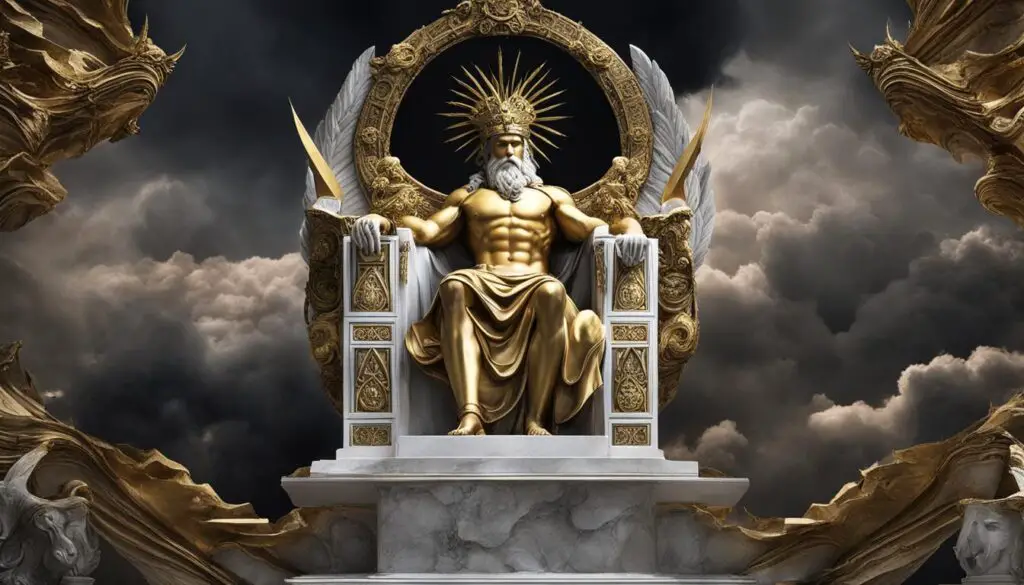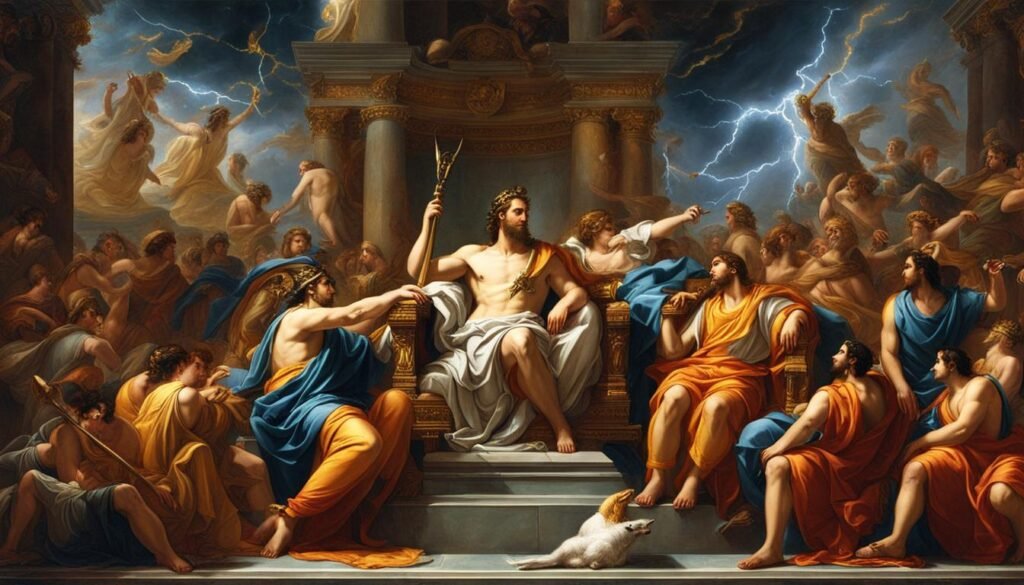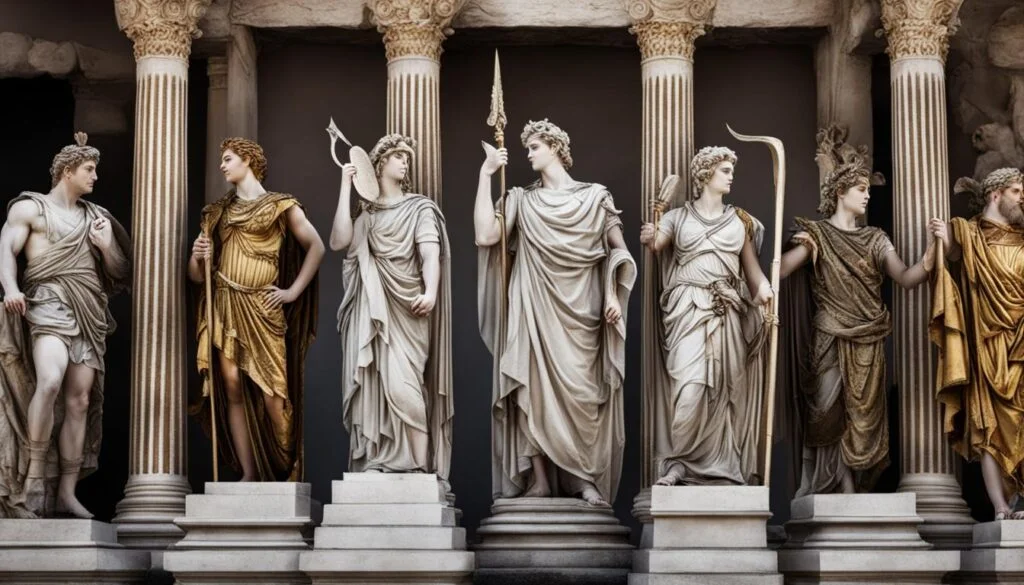Jupiter, the Roman god, held a position of immense respect and significance in Roman mythology. As the king of gods and a sky god, Jupiter’s role was multi-faceted and influential. He oversaw the weather, bringing rain during droughts and ensuring the fertility of the land. Roman worshippers propitiated him on hilltops throughout Italy, while his oldest temple stood proudly on the Capitoline Hill in Rome. Jupiter’s worship was symbolized by the oak tree and the use of pebbles or flint stones in ceremonial rites.
Key Takeaways:
- Jupiter was the chief ancient deity in Roman mythology and was worshipped as a sky god.
- He controlled the weather, bringing rain during droughts, and was propitiated on hilltops throughout Italy.
- Jupiter’s symbols included the oak tree and the use of pebbles or flint stones in ceremonial rites.
- He was also associated with moral conceptions such as oaths, treaties, and leagues.
- Jupiter’s influence extended beyond Rome, making him a significant figure in Roman religion and mythology.
Jupiter’s Mythological Identity and Profile
In Roman mythology, Jupiter held a position of utmost importance as the chief ancient Roman and Italian god. He was worshipped as a sky god and was considered equivalent to Zeus in Greek mythology. Portrayed as a powerful deity, Jupiter was known by the epithet Lucetius, which means ‘Light-Bringer’.
Jupiter’s worship was widespread and took place on hilltops all across Italy. The Capitoline Hill in Rome housed the oldest temple dedicated to him, showcasing his significance and popularity. One of Jupiter’s notable roles was his connection to moral conceptions, such as oaths, treaties, and leagues. This aspect of his mythology emphasized his role as a protector of duty.
Furthermore, Jupiter was renowned for his numerous affairs with mortal women and goddesses, resulting in the birth of famous mythological figures like Hercules and Helen of Troy. These stories further highlighted his influence and impact on Roman mythology and religion.
Jupiter’s Marriage to Juno
One of Jupiter’s notable relationships was with his sister Juno, the goddess of marriage and childbirth. Their marriage represented the divine harmony of marriage and symbolized stability and order. However, despite being married, Jupiter’s numerous infidelities often led to conflict with Juno, who displayed her jealousy and protectiveness over their union by seeking revenge on his lovers and their offspring.
Through their marriage, Jupiter and Juno played a significant role in Roman mythology, highlighting the importance of marital fidelity and illustrating the power dynamics within the divine realm.
Jupiter’s Symbols and Significance
Jupiter was often depicted holding a thunderbolt, a symbol of his control over the weather and his status as the king of the gods. This symbolized his ability to create storms and bring rain during droughts, making him a crucial deity for farmers and those who relied on agriculture.
Additionally, the eagle was considered Jupiter’s sacred bird and represented his ability to soar through the skies. The oak tree, closely associated with his worship, symbolized his power, strength, endurance, and stability. These symbols connected worshippers with Jupiter’s authority and provided them with a sense of belonging and protection.
Overall, understanding Jupiter’s mythological identity, his symbols, and his marriage to Juno provides valuable insights into the rich tapestry of Roman mythology and the cultural beliefs of the ancient Romans.
Jupiter’s Symbols and their Significance in Roman Mythology

In Roman mythology, Jupiter, the king of the gods, was associated with several symbols that held great significance in Roman culture. These symbols served to represent Jupiter’s power, authority, and various aspects of his role in the Roman pantheon.
Jupiter’s Symbols:
- Thunderbolt: One of the most prominent symbols associated with Jupiter was the thunderbolt. Representing his control over the weather and his role as the god of the sky, the thunderbolt symbolized Jupiter’s ability to create storms and bring rain during droughts. This made him an essential deity for farmers and those who relied on agriculture.
- Eagle: Another symbol linked to Jupiter was the eagle. Considered his sacred bird, the eagle represented Jupiter’s ability to soar through the skies and his divine authority. It served as a visual representation of his power and dominion over the heavens.
- Oak Tree: The oak tree held special significance in Jupiter’s worship. It symbolized his strength, endurance, stability, and power. The oak tree was closely associated with Jupiter, and its presence in ceremonies and rituals connected worshippers with the deity’s authority and auspicious nature.
These symbols were not only visual representations of Jupiter’s attributes but also provided worshippers with a sense of belonging, protection, and awe. Through these symbols, individuals could connect with Jupiter’s power and authority, seeking his blessings and invoking his presence in their lives.
Roman Beliefs about Jupiter
In ancient Roman religion, Jupiter held a prominent position as the chief Roman and Italian god, comparable to Zeus in Greek mythology. He was worshipped as the king of the gods and was associated with the sky, thunder, and weather. Jupiter’s role extended beyond Rome, encompassing all aspects of life and maintaining a sense of order and duty.
Jupiter’s worship was deeply ingrained in Roman culture, with hilltops throughout Italy serving as sacred sites for his devotion. The oldest temple dedicated to Jupiter, located on the Capitoline Hill in Rome, exemplified the significance and reverence accorded to him. Roman beliefs surrounding Jupiter reflected his role as a protector of moral conceptions such as oaths, treaties, and leagues.
As the chief deity, Jupiter’s authority extended to the entire Roman pantheon, and his worship was intertwined with the religious practices of the ancient Romans. The influence of Jupiter in Roman mythology served as a cornerstone of their belief system, providing a framework for understanding the world and the divine forces that governed it.
Origins and History of Jupiter

Jupiter, the chief ancient Roman and Italian god, has a rich history that dates back to ancient mythology. Worshiped as a sky god, Jupiter held immense power and authority in Roman religion and mythology. His origins can be traced to the cultural context in which he emerged, where he was revered as the king of the gods and propitiated for rain during droughts.
To understand Jupiter’s significance in ancient Roman religion, it is essential to recognize his role as the chief deity who oversaw all aspects of life. His worship took place on hilltops throughout Italy, and the oldest temple dedicated to him can be found on the Capitoline Hill in Rome. Jupiter’s influence extended beyond Rome, spreading throughout the Roman Empire and becoming the protecting deity of the reigning emperor.
The Powers of Jupiter
- Jupiter was associated with the sky, thunders, and weather, showcasing his control over natural elements.
- He held the power to bring rain during droughts, making him an important deity for farmers and those dependent on agriculture.
- Jupiter’s authority extended to moral conceptions such as oaths, treaties, and leagues, embodying the principles of duty and order.
The mythology of Jupiter also played a significant role in his worshippers’ beliefs. His marriage to Juno, the goddess of marriage and childbirth, symbolized the divine harmony of marriage and represented stability and order in the heavens. Jupiter’s numerous affairs with mortal women and goddesses resulted in the birth of famous mythological figures, highlighting his connection to both the mortal and divine realms.
Overall, the origins and history of Jupiter provide insights into the cultural and religious practices of ancient Rome. His powers, mythological identity, and the spread of his worship throughout the Roman Empire all contribute to his prominent role in Roman religion and mythology.
Marriage of Jupiter

In Roman mythology, the marriage of Jupiter played a significant role and was intertwined with stories of divine harmony, jealousy, and power. Jupiter, the king of the gods, married his sister Juno, who became the Queen of the Gods. Their union symbolized the stability and order of the heavens and served as an example of marital fidelity and divine power.
Despite being married, Jupiter had numerous affairs with mortal women and goddesses, resulting in the birth of famous mythological figures. These stories of Jupiter’s romantic escapades often led to conflicts between him and Juno. As the jealous and protective wife, Juno sought revenge on Jupiter’s lovers and their offspring, showcasing her powerful role as the goddess of marriage and childbirth.
The marriage of Jupiter and Juno not only added depth to their individual characters but also highlighted the intricate relationships within the Roman pantheon. Their union and the subsequent tales of their interactions shed light on the complexities of divine relationships and the dynamics between gods and mortals in Roman mythology.
The mythology of Jupiter’s affairs and Juno’s revenge
- Jupiter’s numerous affairs resulted in the birth of famous mythological figures
- Juno, as Jupiter’s wife, sought revenge on his lovers and their offspring
- The stories showcased the dynamics of divine relationships in Roman mythology
These tales of Jupiter’s infidelity and the resulting consequences added depth and drama to the mythology surrounding the king of the gods. They showcased the complexities of human nature and the gods’ interactions with mortals, providing a rich tapestry of stories that captivated ancient Romans and continue to intrigue us today.
Influence and Spread of Worship

Jupiter’s significance in Roman mythology extended far beyond the boundaries of Rome itself. As the chief ancient Roman and Italian deity, Jupiter’s worship spread throughout the Roman Empire, becoming an integral part of the religious practices of the people. His influence was not limited to the religious domain; he also became the protecting deity of the reigning emperor.
The first Roman emperor, Augustus, embraced the worship of Jupiter and recognized his importance in maintaining social order and the divine harmony of the heavens. This endorsement solidified Jupiter’s position as a revered and respected deity, further ensuring the spread of his worship throughout the empire.
Jupiter’s mythology and stories continue to captivate and inspire people today, providing valuable insights into the beliefs and values of ancient Romans. His power, authority, and connection to the Roman pantheon are immortalized in numerous myths and legends, highlighting his significance in the Roman religious framework.
Jupiter in the Roman Pantheon
In the Roman pantheon, Jupiter held the highest position as the king of the gods. He was worshipped as a sky god and associated with thunders, emphasizing his control over the weather and natural phenomena. His role in overseeing oaths, treaties, and leagues also showcased his moral conceptions and his duty to maintain order and harmony in Roman society.
- Jupiter’s worship took place in temples and on hilltops throughout Italy, with the oldest temple dedicated to him situated on the Capitoline Hill in Rome.
- He was often depicted holding a thunderbolt, symbolizing his power and control over the weather.
- The eagle, considered his sacred bird, represented his ability to soar through the skies.
- The oak tree, a symbol commonly associated with Jupiter, signified his strength, endurance, and stability.
These symbols and rituals served to connect worshippers with Jupiter’s power and authority, providing a sense of belonging and protection.
Conclusion
The Roman god Jupiter held a prominent role in Roman mythology as the king of the gods and the chief ancient Roman and Italian deity. He was worshiped as a sky god and associated with the sky, thunders, and weather. Jupiter’s mythology included his marriage to Juno, numerous affairs, and the birth of famous mythological figures.
Symbols such as the thunderbolt, eagle, and oak tree represented his power and authority. Understanding the origins, beliefs, and symbols associated with Jupiter provides insights into the cultural and religious practices of ancient Rome. Jupiter’s influence extended throughout the Roman Empire, making him a revered and respected deity in Roman religion and mythology.
FAQ
What was Jupiter’s role in Roman mythology?
Jupiter held a position of immense respect and significance in Roman mythology. He was known as the king of the gods and worshiped as a sky god. His role included being the chief ancient deity, overseeing the weather and bringing rain during droughts.
Where was Jupiter worshiped?
Jupiter’s worship took place on hilltops throughout Italy. The oldest temple dedicated to him can be found on the Capitoline Hill in Rome.
What symbols are associated with Jupiter’s worship?
Symbols associated with Jupiter’s worship included the oak tree, which symbolized his power and strength, and the use of lapides silices (pebbles or flint stones) in symbolic ceremonies.
What was Jupiter’s connection to moral conceptions?
Jupiter was connected to moral conceptions such as oaths, treaties, and leagues. He was portrayed as the protector of duty.
What was Jupiter’s marriage like?
Jupiter married his sister Juno, who became the Queen of the Gods in Roman mythology. Their marriage symbolized the divine harmony of marriage and represented the stability and order of the heavens.
How did Jupiter’s worship spread?
Jupiter’s worship extended beyond Rome and spread throughout the Roman Empire. He remained a significant figure in Roman religion and mythology, even becoming the protecting deity of the reigning emperor.
Why is Jupiter significant in Roman culture?
Jupiter’s mythology and stories continue to captivate and inspire people today, providing insights into the beliefs and values of ancient Romans. His influence can be seen in the spread of his worship and the continued significance of his role in Roman culture.




